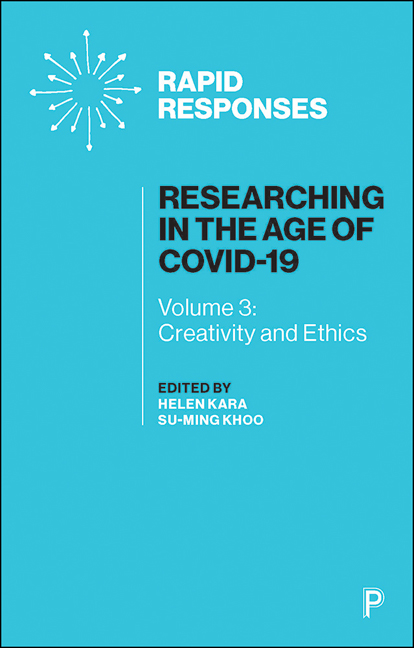12 - Conclusion
Published online by Cambridge University Press: 23 March 2021
Summary
We stated, in the introduction to this volume, that creativity and ethics are closely linked. Some of the chapters in the first two volumes of this three-book series have already demonstrated this. In Volume 1, Judith Henze, Nicole Paganini and Silke Stöber had an ethical foundation for wanting to empower small-scale urban and rural farmers in South Africa, Zimbabwe, Indonesia and Mozambique to find ways to repair and/or maintain local food systems during the pandemic. Another ethical consideration was to amplify the voices of these farmers, many of whom are women, and whose voices are often unheard. Henze and her colleagues and participants made creative use of digital methods within a co-research framework to collect real-time data in a non-intrusive way. In Volume 2, Nicola Gratton, Ryan Fox and Teri Elder took an ethical approach to their ongoing support for participatory action research among UK community researchers who have experienced multiple disadvantages. In lockdown, the project support team gradually deprioritized their research aims and prioritized people's wellbeing, replacing their supportive weekly face-to-face meetings with a WhatsApp group and a raft of creative methods of data collection including photographs, diaries, poems and podcasts. This ethical and creative approach had positive impacts on individuals, relationships and the research team as a whole.
These are just two examples; we could have chosen a number of others. And we are delighted that the chapters in this volume demonstrate the relationship between creativity and ethics even more clearly. The first section, on creative approaches, encompasses design methods, crafting and making, writing in poetry and prose, story completion, and photovoice. These apparently disparate methods have a common element: they prioritize ways in which the participant views or experiences the world over the researcher's agenda. This is aligned with an ethical stance of working to share power more equally within the research enterprise.
Ricardo Sosa and Lisa Grocott reflect on the ways in which design methods can inform and enable research. Speculative thinking enables participants to interact with each other in surprisingly meaningful ways, and analogical thinking prompts participants to go beyond recounting lived experiences to revealing emotions, tensions and imagined futures.
- Type
- Chapter
- Information
- Researching in the Age of COVID-19Volume III: Creativity and Ethics, pp. 120 - 124Publisher: Bristol University PressPrint publication year: 2020



